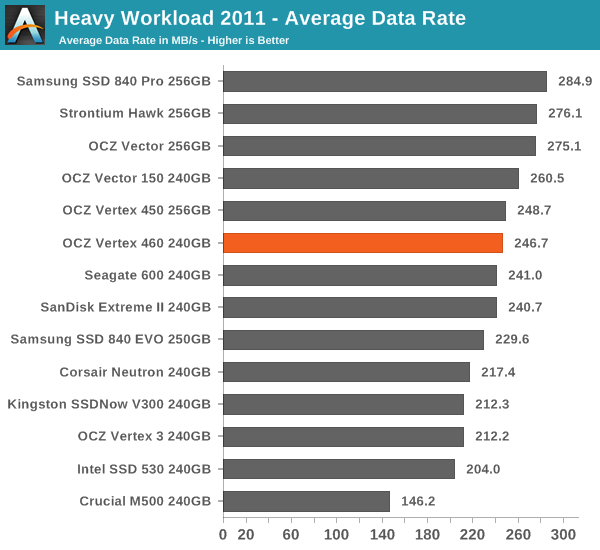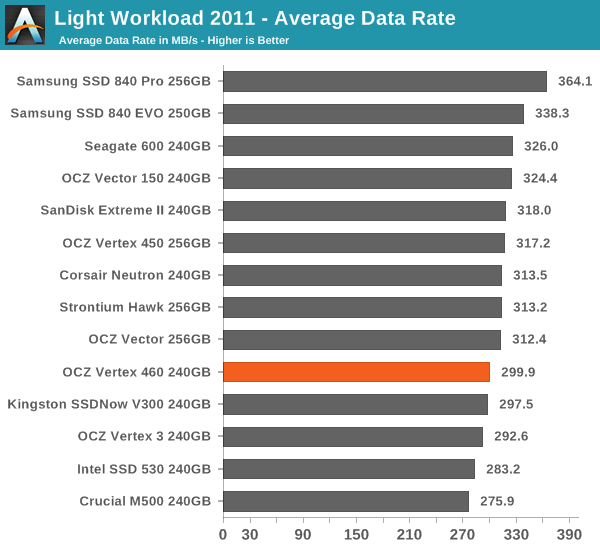OCZ Vertex 460 (240GB) Review
by Kristian Vättö on January 22, 2014 9:00 AM EST- Posted in
- Storage
- SSDs
- OCZ
- Indilinx
- Vertex 460
AnandTech Storage Bench 2011
Two years ago we introduced our AnandTech Storage Bench, a suite of benchmarks that took traces of real OS/application usage and played them back in a repeatable manner. Anand assembled the traces out of frustration with the majority of what we have today in terms of SSD benchmarks.
Although the AnandTech Storage Bench tests did a good job of characterizing SSD performance, they weren't stressful enough. All of the tests performed less than 10GB of reads/writes and typically involved only 4GB of writes specifically. That's not even enough exceed the spare area on most SSDs. Most canned SSD benchmarks don't even come close to writing a single gigabyte of data, but that doesn't mean that simply writing 4GB is acceptable.
Originally the benchmarks were kept short enough that they wouldn't be a burden to run (~30 minutes) but long enough that they were representative of what a power user might do with their system.
1) The MOASB, officially called AnandTech Storage Bench 2011 - Heavy Workload, mainly focuses on the times when your I/O activity is the highest. There is a lot of downloading and application installing that happens during the course of this test. Our thinking was that it's during application installs, file copies, downloading and multitasking with all of this that you can really notice performance differences between drives.
2) We tried to cover as many bases as possible with the software incorporated into this test. There's a lot of photo editing in Photoshop, HTML editing in Dreamweaver, web browsing, game playing/level loading (Starcraft II & WoW are both a part of the test) as well as general use stuff (application installing, virus scanning). We've included a large amount of email downloading, document creation and editing as well. To top it all off we even use Visual Studio 2008 to build Chromium during the test.
The test has 2,168,893 read operations and 1,783,447 write operations. The IO breakdown is as follows:
| AnandTech Storage Bench 2011 - Heavy Workload IO Breakdown | ||||
| IO Size | % of Total | |||
| 4KB | 28% | |||
| 16KB | 10% | |||
| 32KB | 10% | |||
| 64KB | 4% | |||
Only 42% of all operations are sequential, the rest range from pseudo to fully random (with most falling in the pseudo-random category). Average queue depth is 4.625 IOs, with 59% of operations taking place in an IO queue of 1.
AnandTech Storage Bench 2011 - Heavy Workload

The full results, including disk busy times and read/write separations, can be found in our Bench.
AnandTech Storage Bench 2011 - Light Workload
Our light workload actually has more write operations than read operations. The split is as follows: 372,630 reads and 459,709 writes. The relatively close read/write ratio does better mimic a typical light workload (although even lighter workloads would be far more read centric). There's lots of web browsing, photo editing (but with a greater focus on photo consumption), video playback as well as some application installs and gaming.
The I/O breakdown is similar to the heavy workload at small IOs, however you'll notice that there are far fewer large IO transfers. Interestingly, the 480GB drive actually comes out ahead in this case, suggesting it's more capable at light workloads.
| AnandTech Storage Bench 2011 - Light Workload IO Breakdown | ||||
| IO Size | % of Total | |||
| 4KB | 27% | |||
| 16KB | 8% | |||
| 32KB | 6% | |||
| 64KB | 5% | |||











69 Comments
View All Comments
jragonsoul - Wednesday, January 22, 2014 - link
But they really aren't, OCZ is still OCZ and they are still making their own drives. I see that as a smart move by them because if Toshiba would have swallowed the company and they made some SSD's I know at least me and my tech friends would have stayed well and far away until EXTENSIVE reviews appeared.AssBall - Wednesday, January 22, 2014 - link
OCZ had a bad run of drives and couldn't get it fixed. Years before that, they made excellent memory, and good PSU's. Their early SSD's were pretty good too. Being hung up on their screw up sounds like you can't get over personal issues. They will come back and be profitable again. Toshiba will help right the ship.Samus - Wednesday, January 22, 2014 - link
Yep. Let's not forget those poor early adopters of MacBook Air's that were unlucky enough to end up with a Toshiba drive instead of a Samsung (Apple was using both vendors through production, so it was luck of the draw)Needless to say Apple doesn't use Toshiba SSD's much anymore, even with their bitterness with Samsung.
lmcd - Thursday, January 23, 2014 - link
"Much."So?
DarkStryke - Wednesday, January 22, 2014 - link
You have some pretty nice revisionist history there. Take your own advice and learn about the history of OCZ, especially before the company incorporated under that title.I hear the overclockerz store had great customer service too!
Once a fool..
GTVic - Thursday, January 23, 2014 - link
My OCZ power supply died precisely after the warranty expired.random2 - Sunday, February 2, 2014 - link
You cannot blame a person for feeling that the OCZ name is a deterrent. Doesn't even have to be personal to want to see people avoid product that has not been good for years, hasn't been good through numerous models of drives, and has casued a great many people a lot of heart ache and frustration. All becasue OCZ couldn't bring themselves to make sure their product was viable and market ready BEFORE it went out their door.http://www.behardware.com/articles/881-7/component...
Go ahead....buy an OCZ drive.
AMRAAM_Missiles - Thursday, March 20, 2014 - link
Eventhough you make sense, that the company has a dark area which it lost the trust from a lot of people, it doesn't mean that it won't get better.My first ever SSD was the Vertex 4 from OCZ, and guess what, it is still regarded as one of the best Performance SSD that money could buy today. 3 solid years of grinding the OS with constants write and read, it shows no drop in performance. I am not saying that failures are not real, but it doesn't go the extend that people make it out to be.
Now, i have just bought another Vector and Vector 150 for my rig, and i couldn't be more happier with a role of a normal consumer and an enthusiast of PC in general. Sometime, people just have to hate for the sake of hating without even trying to open their eyes to verify the current situation a little bit.
JDG1980 - Wednesday, January 22, 2014 - link
That was my thought, as well. The purchase of OCZ made sense, because they have some decent controller IP and Toshiba wasn't too strong in that area, but the OCZ name is dirt because of their horrendous record of reliability, so I have no idea why they wanted to keep that.Samus - Wednesday, January 22, 2014 - link
I remember an interview Anand posted years ago with the CEO of OCZ, and Anand was pretty adamant about them ditching their name (for obvious reasons) and the CEO said they were going to keep it. That didn't work out so great for them. I don't see it working for Toshiba, either. They need to ditch the name and come up with another one, or just call it Toshiba.